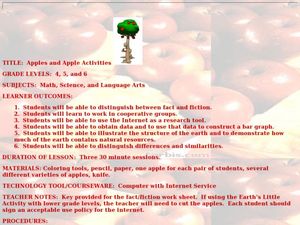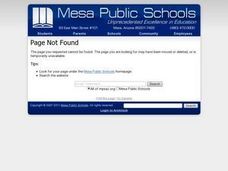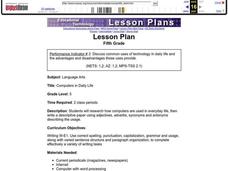Microsoft
Coordinates
What are your coordinates? After learning about coordinate systems in the real world, scholars see how a three-dimensional coordinate system works in Minecraft. They write a program to produce a compass rose and conduct an activity where...
Curated OER
Technology in 2nd Grade
Second graders explore ways to use computers. They practice spelling words using Kid Pix software, write Bible verses and illustrate them. They read stories and illustrate and write about their favorite characters. They create pattern...
Curated OER
Triton Toys
Students investigate the hydrological cycle. The instructional activity is made to be performed within the computer lab. The instructional activity can also be done as a center for students to work on the project as time allows.
Curated OER
Autobiography: Storytelling
Students investigate using computers to write an autobiography over an extended period of time. They use the Kidpix computer software to practice the writing process. As an extension to the lesson students can take digital pictures to be...
Curated OER
Becoming Comfortable with the Navigation Features
Middle schoolers, while in the computer lab, log in and go to the American Education System to complete a activity on the American Education System unit. They review all the terms they may see pop up on their screens (link, save, shift,...
Curated OER
Lesson Plan 1: Practice Keyboarding Skills
The two lessons in this resource serve as an introduction to the keyboard and typing. While seated at a computer, pupils view an overhead display of the board and are introduced to the functions of the various keys. Designed for language...
Curated OER
Apples and Apple Activities
Students investigate apples. In this reading comprehension activity, students read a book about apples then compare and contrast, make graphs, distinguish between fact and fiction and work in groups. Students work in groups to search the...
Curated OER
Break the Code!
Seventh graders crack a code using binary numbers. In this technology lesson, 7th graders explain how binary codes can represent letters and numbers. They create their own code and exchange them with their classmates.
BBC
Community Action
How does community involvement make good citizens? Use all or a few of the included ideas to foster a better understanding of what it means to be a good citizen. Learners will brainstorm community issues, discuss how to get involved, and...
Curated OER
Math: Matching Rods and Religion
Math and religious studies are integrated together using using cuisenaire rods and Kid Pix for this problem-solving exercise. In pairs, they match different colored rods to represent various groups of people. Meanwhile, students at...
Curated OER
Dental Health
Fourth graders investigate the types of habits that are necessary for good dental health. They use information provided from a variety of resources to make conclusions of the overall practice of dental hygiene. Then students produce a...
BBC
Coasts
Youngsters study the variety of ways that coastlines can be eroded. They do this by accessing a website, embedded in the plan, and answering questions found on the pages. This activity is meant to be done individually, so everyone in the...
Curated OER
The Story of the Solar System
There is more to the solar system than the typical study of the sun and planets. Launch a study of asteroids, meteoroids, and comets by watching the video The Story of the Solar System, available for purchase through this resource on the...
BBC
Victorian Lesson Plan
How has England changed? Are the streets the same today as they were in the time of the Tudors? Fourth year students compare and contrast the Victorian & Tudor streets to the streets of today. They research biographical information...
Curated OER
Dictionary Use
Bring dictionaries back into your classroom! Although it's often preferred to look up a word's definition on a computer or smart phone, we still need to practice this important skill. Middle and high schoolers investigate how to use the...
Curated OER
Insects
It's a fact: kids love bugs! With this lesson, young learners explore reading informational texts and conducting research while learning about their favorite insects. Spark learners' interest by reading a book about one kind of bug and...
Kenan Fellows
Designing a Water Treatment Plant
How does dirty water get clean enough to drink? After viewing a PowerPoint that outlines the process water goes through at a water treatment plant, groups work together to design a chlorination chamber for a treatment plant.
Curated OER
Implementing Technology
Students gain basic insight to technology of the computer, study ethical responsibility, and develop positive attitudes toward the technology. Students know what the basic key functions are on the keyboard and how to use them properly....
Curated OER
Mystery Operations: Math, Patterns, Logic
In this activity the computer/teacher makes up a mystery operation, and you have to figure out what the operation is. You give the computer/teacher two numbers to calculate, and it tells you the answer. This is your first piece of...
Curated OER
An Amazing Story
Students develop sequential stories to guide a partner through a computer-generated maze. In pairs they illustrate each place and character listed, build and print a maze, and write a class-generated story.
Curated OER
START Phonics Practice, Computer Style
First graders type words that match a given sound or phoneme on a computer.
Curated OER
Innovative Celebration of Enrichment
Young scholars start at the beginning of the day and move and rotate individually or with friends. They go to as many or as few centers as they wish such as: PE, Art, Music, Media, and Computers. Students do not have to stay together. ...
Curated OER
Using Computers for Statistical Analysis of Weather
Students use temperature, cloud cover and other weather data from the S'COOL website to statistically analyze weather around the country. They use computers to calculate and graph standard deviations, means and modes of the weather...
Curated OER
Computers in Daily Life
Fifth graders research how computers are used in everyday life, then write a descriptive paper using adjectives, adverbs, synonyms and antonyms describing the usage.

























